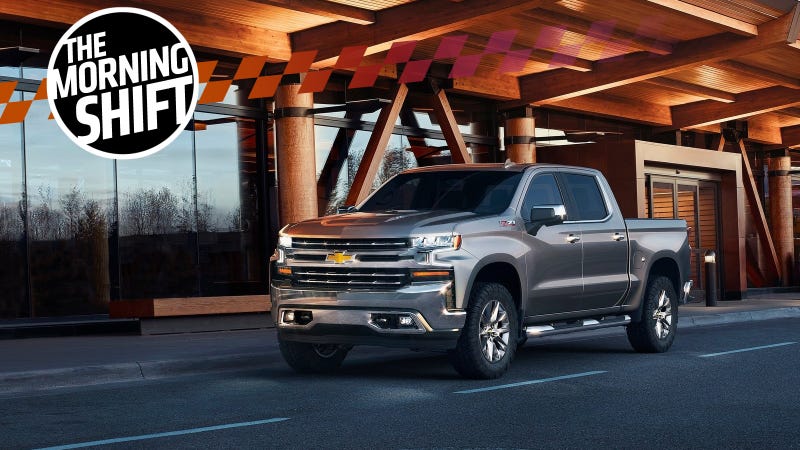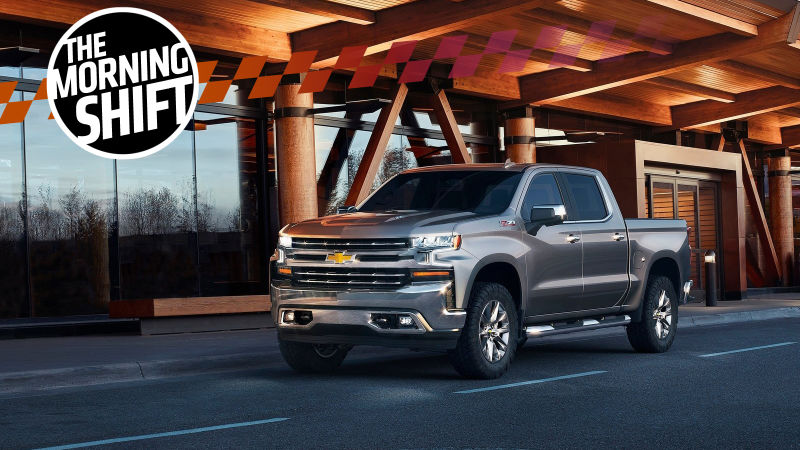
 The Morning ShiftAll your daily car news in one convenient place. Isn’t your time more important?
The Morning ShiftAll your daily car news in one convenient place. Isn’t your time more important? Pickup truck prices are out of control, Smart lives to fight another day in China, Volkswagen wants nothing to do with this Nissan-Renault-Fiat Chrysler merger business and so much more for The Morning Shift of Thursday, March 28, 2019.
1st Gear: Pickup Buyers Are Fed Up With ‘Overpriced’ $50,000 Trucks
For a hot minute now the average new car price has been about $34,000, a historic high in the industry. But if you want a truck, it’s even more—almost $50,000. That’s a lot for a segment that used to offer almost exclusively utilitarian work vehicles but now trades in gigantic, leather-lined near-luxury vehicles full of expensive features.
Those trucks are incredibly lucrative. The American automakers in particular have essentially become truck and SUV manufacturers that occasionally make sedans and cars as a side hustle, if at all. The key is profit margins—you take a basic truck and turn it into a King Ranch or Sierra Denali or whatever, pile on the options and watch your money stack higher and higher.
Buyers are getting sick of it, and they don’t feel like their trucks are even that well-built anymore, according to a CarGurus study—the very officially titled “2019 Truck Sentiment Survey”—reported on by the Detroit Free Press:
With the average transaction price for a new full-size truck near $50,000, the expense of buying and maintaining a pickup are pushing some pickup owners into other vehicles. The survey found that only about 15 percent of current pickup owners say the vehicles are a good value.
CarGurus, an online automotive marketplace that connects buyers and sellers of new and used cars, surveyed 1,067 current and former pickup owners last month, the split being about 50/50. Among the current owners, 195 own a Ford pickup, 154 own a Chevrolet pickup, 106 own a Toyota and 101 own a Ram.
The survey found that 68 percent of pickup owners said their vehicles were overpriced. Forty-eight percent said the trucks aren’t made as well as they used to be and 17 percent said they probably will not buy another pickup.
Advertisement
Interestingly—and I’m convinced this isn’t a huge phenomenon yet but it could be later—some buyers are so fed up with truck prices they’re actually moving back into sedans:
Among the former pickup owners who switched to another type of vehicle, 37 percent now own a traditional SUV or crossover and 35 percent now own a sedan, the survey said.
“What an interest finding in that study,” Gross said. “What we see as the top reasons people are switching categories is that trucks have poor fuel efficiency and they’re high cost. Switching into a large SUV might not make as much sense as a sedan.”
Nearly half of current pickup owners, 47 percent, cited “gas mileage” as a reason for considering another brand of pickup, up from 38 percent in the year-ago study. Nearly 42 percent of former pickup owners said fuel efficiency was a top reason for abandoning pickups for a different vehicle.
“It speaks to gas mileage and fuel efficiency being top of mind to car buyers overall right now,” said Gross.
Advertisement
Also worth noting these ridiculously high transaction prices were driven by cheap and readily available credit, and that certainly won’t last forever.
2nd Gear: Ford and VW May Do a Truck Together
Part of me feels like these explosive mid-size trucks prices have driven some demand for trucks like the Chevrolet Colorado, whose success prompted Ford to bring the Ranger over here, and the continued dominance of the Toyota Tacoma. Sadly we don’t get the cool Volkswagen Amarok here, but the next one could have a lot of Ford in it, reports Automotive News Europe:
Volkswagen Group said it has signed an initial contract to develop a successor to the VW Amarok pickup with Ford. VW also said it is continuing discussions about extending its alliance with Ford to include autonomous driving and mobility services.
Ford has a platform for its Ranger midsize pickup, which could help VW lower development costs.
Other joint projects with Ford could follow, Volkswagen Commercial Vehicles CEO Thomas Sedran said on Thursday. These could include additional vehicle projects, autonomous driving or shared use of electric mobility platforms.
In January, VW and Ford agreed to develop a range of commercial vehicles and explore cooperating on electric and autonomous cars as part of an alliance designed to save each automaker billions in costs.
Advertisement
Again, the future is in joint ventures and consolidation.
3rd Gear: Smart and Geely, an Idea Whose Time Has Come
Daimler-Benz’s microcar brand Smart has had a weird week. First, reports surface that the parent company’s new CEO has no love for this money-losing venture and may cut it loose. Then we hear Geely, the Chinese automaker on a buying streak as of late, may be interested too.
Advertisement
Now today we learn that officially, Daimler and Geely will transform Smart into a Chinese-built electric car brand in a new joint venture. Via Automotive News:
The Smart microcar brand will be expanded into the subcompact segment and will build all future models in China for global markets in a joint venture owned by Daimler and Zhejiang Geely Holding Group.
The 50-50 joint venture will build a new generation of Smart models in a purpose-built electric-car factory in China with global sales due to begin in 2022, Daimler said in a news release on Thursday.
Daimler will share its expertise in manufacturing, engineering and design with Geely. Mercedes designers will style future Smart vehicles and Geely will engineer them.
As part of the vehicle-development program, the Smart product portfolio will be extended into the “fast-growing” B- (subcompact) segment, Daimler said.
Daimler and Geely did not disclose financial terms of the deal. The details of the joint venture will be finalized by the end of this year, the companies said.
Advertisement
As that story notes, Smart has been “racking up losses” since it launched in the late 1990s and only sold 1,276 cars in the United States last year. It now only sells electric cars here.
So why China, and why EVs?
Daimler is betting young, city-dwelling consumers in China, the world’s largest auto market, to help rejuvenate the brand. Financial analysts Evercore ISI estimates Smart loses as much as 700 million euros ($787 million) annually.
The high cost of electric car batteries has made it hard for automakers to build affordable zero-emissions vehicles, leading several of them to strike alliances with Chinese partners. Daimler’s German rival BMW recently unveiled plans to build electric Minis in China, where production costs are low and demand for small electric cars is rising.
Advertisement
The Smart ForTwo and ForFour will continue production in France and Slovenia until 2022. After that, they’re off to Geely.
4th Gear: I Don’t Know Her
But the biggest merger talk lately is a possible fusion of Nissan, its alliance partner Renault and Fiat Chrysler. I don’t think that will happen—the first two couldn’t merge without its former boss getting whacked and FCA has two merger opportunities a month, it feels like—but Renault is apparently pushing for it and FCA wants a partner.
Advertisement
So when asked what’s going on, Nissan CEO Hiroto Saikawa had this to say: “Buh?” From Automotive News:
Nissan CEO Hiroto Saikawa said he was not aware of discussions about the possibility that its French partner Renault was considering a bid for Fiat Chrysler Automobiles.
When asked by reporters whether he had heard about the talks, Saikawa responded: “Not at all.”
The Financial Times reported that Renault is aiming to restart merger talks with Nissan within a year as the first step toward creating a bigger auto conglomerate that could involve a bid by both companies for Fiat Chrysler. Spokesmen for Renault, Nissan and Fiat Chrysler declined to comment on the report.
Japan Chief Cabinet Secretary Yoshihide Suga said the government is unaware of the facts related to reports about Renault restarting the merger talks with Nissan. He said any specific movement toward maintaining or strengthening the alliance should be discussed “in a manner satisfactory” to the related parties.
Mitsubishi Motors CEO Osamu Masuko also said he has heard “absolutely nothing” about such talks.
Advertisement
Shit, how could you leave the Mitsubishi guy out of the loop! Hasn’t he been through enough?
5th Gear: Leave Us Out of This
Speaking of, there’s still occasional talk of a tie-up between FCA and Volkswagen, another global conglomerate with its hands in pretty much every segment. But apparently VW isn’t into it.
Advertisement
Here’s this brief dispatch from Reuters:
Volkswagen is not interested in a tie-up with rival Fiat Chrysler as the German carmaker’s efforts were all focused internally, Chief Executive Herbert Diess told Il Sole 24 Ore and other two newspapers.
Asked whether Volkswagen was interested in Fiat Chrysler’s premium brands Alfa Romeo and Maserati, Diess said his group “already owns luxury brands”.
Advertisement
“We already have luxury brands” is a very funny line to me.
Reverse: Willow Run
Advertisement
Neutral: What Does Our Consolidated Future Look Like?
My guess: BMW and Daimler are the same company, FCA probably gets acquired by Geely which goes on to be a VW-level conglomerate, GM stays afloat, Toyota absorbs Mazda and Subaru, who the hell knows with Ford or Nissan/Renault, and half the automakers out there are using VW’s electric platform on a license.
But that’s just a guess.













